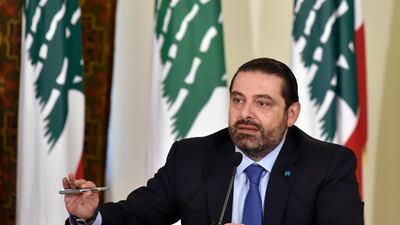The CEDRE conference, which helped raise more than $11 billion (Dh40.4bn) for Lebanon form international donors, confirms the debt-laden country still garners support from the international community, a new report said.
A large investment program is in the works in Lebanon, whose economy is severely burdened by the influx of about a million Syrian refuges. However, there is little visibility on the needed fiscal reforms, which is not encouraging in the short term for the country with a debt-to-GDP ratio of around 150 per cent, Bank of America Merrill Lynch said in a report released on Thursday.
The CEDRE’s aim is to “effectively tackle Lebanon's low growth-high debt macro challenge through a combination of fiscal reforms and investments financed by concessional loans and the private sector”, the report said. “Fiscal consolidation is necessary to minimise the impact of additional borrowing on debt dynamics while structural reforms are needed to ensure timely project implementation and raise capacity absorption.”
Lebanon called for the donor conference to help finance infrastructure projects as the government cannot finance such schemes.
The country's economy is hurting from the ongoing seven-year war in Syria, which has curtailed an important trade and business route, and led to the influx of refugees. Lebanon's heavy debt burden, the highest in the Middle East, is also a concern for investors, who are not as eager as before to invest in a country struggling to control its finances.
Lebanese authorities have presented an ambitious capital investment programme that includes 275 projects to develop and rehabilitate the country’s dilapidated infrastructure. The total cost of the CIP is $22.9bn, more than 41 per cent of GDP, across three cycles spanning the period 2018-2030.
About 33 per cent is projected to come from private investment as concessional loans are likely planned to finance projects with low economic returns. The cost of the first CIP phase over the next six years is $10.8bn, according to authorities' estimates. The CEDRE pledges more than fully cover the cost of the first cycle of the CIP, the report noted.
The re-pledging of a $1bn credit line from Saudi Arabia and $670 million from France helped the conference exceed the Lebanese estimates. Other pledges included $1.35bn in loans from the European Bank for Reconstruction and Development and $500m from The Kuwait Fund for Development.
CEDRE follows from the Rome II conference on 15 March which served to support the five-year strategic plans of the Lebanese Armed Forces and Internal Security Forces. A further conference, Brussels II, is planned in the last week of this month in response to the Syrian crisis and to support the resilience of refugee-hosting countries.
The pledges earmarked for investment over the next five years to overhaul the country’s ailing infrastructure and to lift its $53bn economy’s faltering growth, is credit positive, Moody's Investors Service said on Thursday.
"It [pledges] supports the resumption of public investment, while incentivising fiscal reform implementation as a condition for disbursements," Moody's said.
The rating agency forecasts growth at an average of 3 per cent in 2018-21, compared with an average of 1.6 per cent for 2013-16, and factors in an uptick in investment activity.
Despite the CEDRE pledges, Lebanese authorities and the government led by Prime Minister Saad Hariri have work cut out for them and will have to work closely with the international donors, which will be key to the disbursement of loans, Bank of America noted.
________________
Read more
Lebanon promised more than $10bn in grants and loans
Lebanese politicians and experts weight in on Cedre conference
Lebanon's donor conference is a 'Band-Aid' to the debt-laden country's financial woes
________________
Meanwhile Mr Hariri on Wednesday said that there is a mechanism to follow-up on the implementation of the reforms to unlock the pledges.
“CEDRE is the beginning of a process to modernise our economy, to rehabilitate our infrastructure, to boost the potential of the private sector and to achieve economic sustainability,” he said at a press conference in Beirut.
Structural reforms within the administration, fighting corruption, modernising legislations for the private sector and sectoral reforms for optimising investment in infrastructure, are part of the implementation process.
“Most of these loans are very soft loans with interest of 1.5 per cent maximum with a grace period of seven-to-ten years and a maturity period that exceeds 25 years," he said. "These loans will only be used for infrastructure projects that Lebanon is in dire need of and without these soft loans Lebanon would be forced to take loans with 7 per cent interest."


